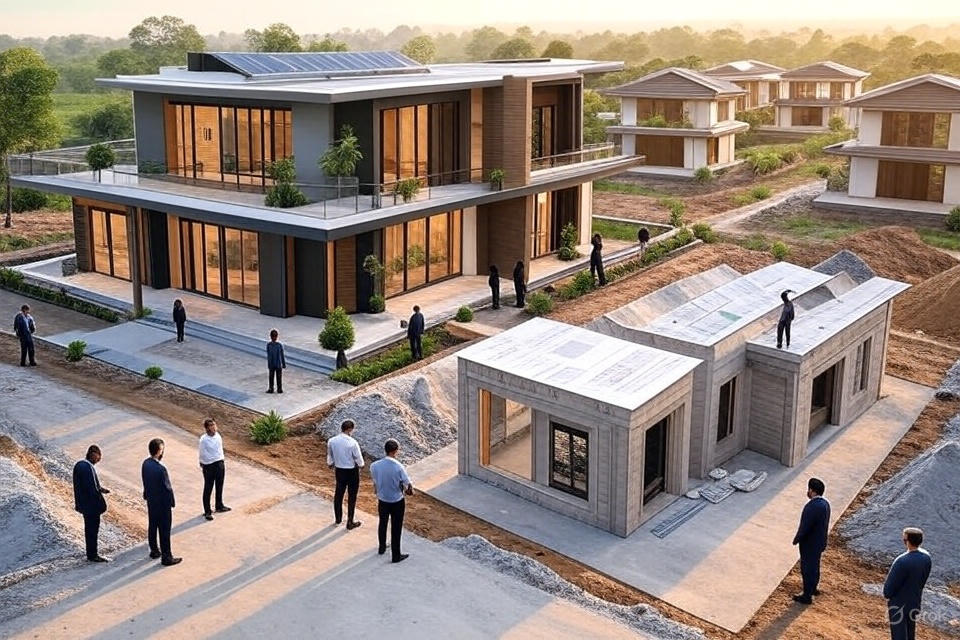What Investors Need to Know in 2025
As the interest in rural luxury and sustainable living continues to grow, farmhouse projects are becoming more than just weekend retreats—they’re evolving into smart investments. However, one crucial factor often overlooked by potential investors and businesses is the intricate web of government policies regulating farmhouse developments. From zoning restrictions and land conversion norms to environmental clearances and taxation laws, these regulations can directly impact the profitability and legality of any farmhouse venture.
For investors, HNIs, and entrepreneurs looking to buy agricultural land or develop farmhouse communities, awareness of these evolving policies is not optional—it’s essential. A lack of clarity can result in stalled projects, hefty penalties, or even land seizures. This blog serves as a practical guide to understanding the latest farmhouse projects and the government regulations that govern them. Whether you’re planning your first investment or scaling your rural land portfolio, staying informed is your first step toward making sound decisions.
Why Farmhouse Projects Are Gaining Momentum
Over the past few years, the demand for farmhouse plots and luxury rural residences has surged across India, especially in regions surrounding Delhi-NCR, Uttarakhand, Rajasthan, and Maharashtra. This shift is driven by:
- Desire for open, green spaces post-pandemic
- Increased work-from-anywhere flexibility
- Long-term asset value appreciation
- Potential for farm-to-table business models and agri-tourism
However, with opportunity comes oversight. State and central governments have taken note of the unregulated sprawl and are now actively tightening policy frameworks to ensure ecological balance, prevent illegal construction, and formalize rural real estate transactions.
Key Government Policies Impacting Farmhouse Projects
1. Land Use and Zoning Regulations
Every state in India has its own master plan defining how land can be used—agricultural, residential, commercial, or industrial.
- Farmhouses are generally permitted only on agricultural land, subject to minimum plot size rules (usually 1 acre or more).
- Unauthorized farmhouse construction on non-permissible land can lead to demolition or legal action.
- Conversion of agricultural land to residential use requires permission under local land ceiling and planning laws.
Example: In Delhi, the Delhi Master Plan 2041 allows farmhouses under the “Low-Density Residential Area” category but limits construction to a maximum of 0.05 FAR (Floor Area Ratio) in designated Green Belt zones.
2. Environmental Clearances and Green Norms
New farmhouse projects are being scrutinized under environmental policies:
- Projects over a certain area threshold need Environmental Impact Assessment (EIA) clearance.
- Construction must comply with rainwater harvesting, waste disposal, and green cover norms.
- States like Uttarakhand and Himachal Pradesh have strict ecological guidelines to prevent deforestation and landslides.
Tip: Always check for eco-sensitive zones (ESZ) near forest areas or rivers before investing.
3. Restrictions on Ownership of Agricultural Land
India has diverse rules for who can legally own agricultural land:
- Non-agriculturists (especially in states like Karnataka and Maharashtra) may be barred from buying farmland unless they meet specific income or occupation criteria.
- NRIs cannot buy agricultural land, plantation property, or farmhouses under FEMA rules.
This makes due diligence and verification critical before any farmhouse purchase.
How Policies Are Changing in 2025
Recent policy shifts indicate a more structured and transparent approach to rural land development:
- Digitization of land records is enabling better ownership tracking and faster registration.
- Single-window clearances for rural real estate projects are being introduced in some states to streamline approvals.
- Zoning flexibility for agri-tourism and farm stays is being considered to boost rural economies.
These changes are intended to curb illegal land use while supporting legitimate farmhouse development as a growing sector in real estate.
Tips for Investors: Navigating Policy with Confidence
To make informed investments in farmhouse projects, keep the following in mind:
- Engage local legal and land consultants to interpret state-specific rules and zoning maps.
- Verify the land title and revenue records through the state’s online portals or patwari office.
- Check the master plan for permissible land use and construction norms.
- Avoid middlemen promises of “easy conversion”—unauthorized changes can backfire legally.
- Ensure compliance with building bylaws, FAR limits, and green norms from day one.
Trending Farmhouse Projects Aligned with Policy
Some developers are proactively aligning their farmhouse communities with regulatory frameworks:
- Low-density plotted developments with government-approved zoning
- Green-certified projects with rainwater harvesting, native plantations, and solar energy
- Agri-resorts and weekend farm stays that blend hospitality with compliance
These projects not only mitigate regulatory risk but also offer better long-term value appreciation and rental income opportunities.
Government Support for Rural Investment
Many states are actively encouraging sustainable rural investments by:
- Offering subsidies for solar installations and organic farming
- Promoting agri-tourism policies to legalize farm stays and generate rural employment
- Supporting infrastructure development like road access and electricity to rural plots
For businesses and individuals looking to build on agricultural land legally, these incentives present a strong case for planned development rather than unregulated expansion.
Conclusion
The growing interest in farmhouse projects is understandable—but it must be matched with an informed approach to government policy. Whether you’re a business eyeing large land parcels or an individual seeking a peaceful retreat, understanding zoning laws, land conversion rules, and environmental requirements is essential. Compliance isn’t just a checkbox—it’s a risk management strategy.
Investing in rural land and farmhouse projects in 2025 offers great potential, but only when done legally and sustainably. For those who want to go beyond speculation and build a valuable asset, aligning with policy is the key.
To explore more insights on farmhouse regulations, verified land listings, and compliant project development, browse through our blog archives or reach out for a detailed land investment guide tailored to your state.



Join The Discussion